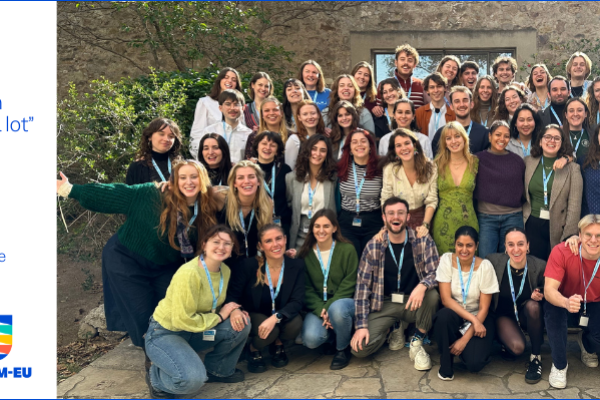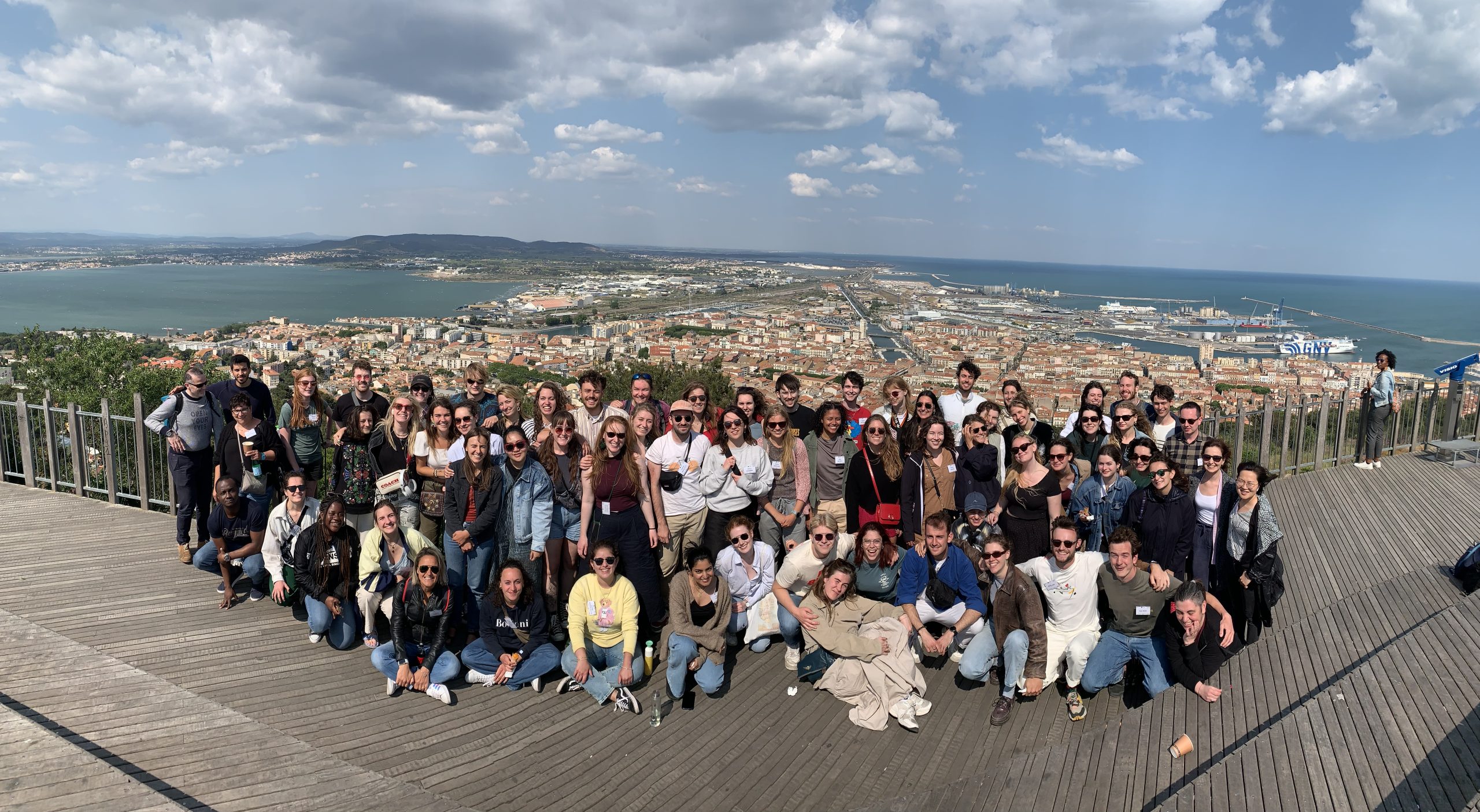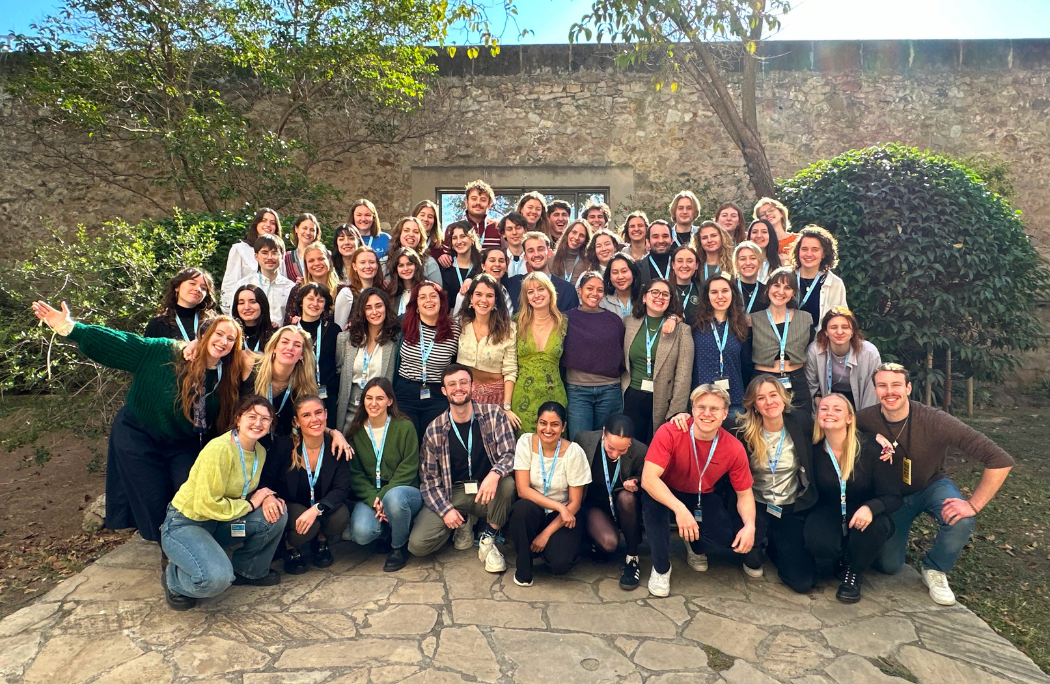Applications are open for the new edition of CHARM-EU’s transdisciplinary Master’s in Global Challenges for Sustainability. We sat down with fresh graduate András Kovaloczy to talk about the innovative elements of the programme and his personal experiences gained as a CHARM-EU student.

This special programme welcomes students with a Bachelor’s degree in any study fields. Can you tell us a bit about your background, what did you do, what have you studied before joining CHARM-EU?
I studied in Amsterdam, the Netherlands, for a social science bachelor’s degree called PPLE, a programme combining the fields of Psychology, Politics, Law and Economics. I chose the law specialisation, but I also had courses from the other three disciplines. I graduated in 2020 during the period of the pandemic lockdowns and decided to move back home to Budapest. I started to work for a large international company, but after a year, I decided to be a freelancer. I started working in the media sector, mainly as a translator and editor. And I continued this part-time job during the programme.
Why did you decide to pursue the CHARM-EU Master’s degree?
I have always planned to continue with my studies, and preferably abroad, but there were a lot of uncertainties in the midst of the pandemic. Would the universities open? Can I go back to the Netherlands or not? So, I decided to start working in Hungary instead. But it’s precisely this that picked my interest about the CHARM-EU Master’s: that you can study in English, in an international environment, as part of an international community, with teachers coming from various countries, for a favourable tuition fee and partly in Hungary. I spent the first semester in Budapest, the second and third in Barcelona and two weeks in Montpellier as part of a short-term mobility.
<img alt="Group picture made during a footrace in Barcelona (András Kovaloczy is the person on the right)" data-align="right" data-caption=" <em>Group picture made during a footrace in Barcelona<br />
(András Kovaloczy is the person on the right)</em>” data-entity-type=”file” data-entity-uuid=”214f7aaf-a3b4-4585-bf2d-3e492ca8442c” height=”560″ src=”/sites/default/files/inline-images/barcelona%20run.jpeg” width=”420″ />
With mobility embedded in the structure of the Master’s, CHARM-EU students can change campuses several times during the 18 months of the programme. How does this affect student life and community building?
Even though we were rarely all together in the same place, we formed a much stronger community compared to my undergraduate and high school experiences. There were sixty of us in the cohort, which I think is a very ideal number, I would recommend Master’s or even Bachelor’s programmes with similar student numbers for everyone.
Maybe the reason we formed such a strong community is that although we were on different CHARM-EU campuses, we had group projects from the very first semester with peers from several campuses working together. The same was true in the second semester when we moved from one place to another as part of the compulsory phase mobility. I moved from Budapest to Barcelona, while others moved to Utrecht or Dublin for a full semester. And what brought our student community even closer together was our two-week joint study trip to Montpellier.
How was this study trip structured, what did you do during the two weeks?
The challenge-based approach is very important in CHARM-EU, it means that we focus on specific problems that we identify and try to solve together with our teachers. In addition, we have opportunities to work with external stakeholders, who could be representatives of a company, an NGO or a public or municipal authority. During this study trip called MoXMo (Montpellier Cross Thematic Mobility), all sixty students of our cohort, regardless of our specialisation, spent two weeks together to work in groups of 4-6 on a local challenge or problem. My group worked together with an external partner from the Municipality of Sète, a small French town near Montpellier, to identify schemes for improving the mental health of local young people.
How does this particular field trip and the choice of specialisation fit into the overall structure of the programme?
The programme has 3 semesters, called phases in CHARM-EU. In the first phase, we all have the same courses, focusing on sustainability, transdisciplinary research and social innovation. In the second phase, we can choose from three thematic tracks: Water, Food or Life and Health. Then, during the third, Capstone phase of the programme we work in groups of 3-6 on a specific challenge, similar to the mobility week in Montpellier but on a much larger scale, with each group having at least one student from each of the three thematic tracks. For the second phase, I chose the Life and Health track as I am surrounded by medical professionals and students, and examining the sustainability aspects of health management seemed like an interesting direction for me. It was not an easy choice since I was also interested in the topic of water, so I would recommend everyone to do their research on the different tracks before deciding.
During the final phase of the programme, what Capstone project were you working on and with which stakeholder?
We worked together with representatives of a peri-urban farming area located next to Barcelona called the Baix Llobregat Agrarian Park (PABLL). They applied to become external stakeholders for the Capstone phase of the Master’s because they wanted to better integrate the principles of circular economy into the operation of their farming system. During our first meeting together, we decided to focus on the management of the processing of agricultural plastic waste, as this was an important area for them and seemed feasible from the point of view of our diploma project as well.
During the five months of the Capstone, we examined how to reform the processing, recycling and transportation of plastic waste in the park, and we wrote our master’s thesis about this topic. One of the special features of CHARM-EU is that we not only submit a typical thesis, but also prepare a more practical “Capstone product”, for example a concrete feasibility plan. In our case, we prepared a policy brief for the European Commission, a proposal package for the management of the park, and a guideline document for farmers summarizing how they can make their use of plastic more sustainable on the individual level.
“the fact that we are able to make a small contribution to change in a specific area with our project has inspired me a lot”
What is the added value of not only preparing a thesis, but also a “product” that can be of practical use?
For me, this practical focus made the process much more motivating. We cannot change the world, of course, but the fact that we are able to make a small contribution to change in a specific area with our project has inspired me a lot. It also felt a bit like we were already working as professionals since the experience was similar to participating in an internship, and this fits well with CHARM-EU’s effort to try to bring the world of academia and external stakeholders from different sectors closer together.
Cooperation was not always easy, there were challenges, but I think this is exactly what happens in a workplace or in any career: the clients or your boss might have different expectations than you, and these must be reconciled and agreed upon. CHARM-EU provided a framework for the collaboration, and at the beginning of the Capstone phase, we made an agreement with the external partner about what we, the students, have to do, what is actually feasible to do in this period of 5 months, and what they as partners will bring into the project.
Your cohort has recently participated in the so-called Grand Finale in Barcelona. Why is this event important, what is its significance?
It is perhaps comparable to defending your thesis. Most of the students travelled to Barcelona in person, some joined online, and during the two-day conference, each group presented their work, mainly focusing on the Capstone Product, which is the practical implementation of the thesis. This is essentially the conclusion of the whole programme, to be followed by a graduation ceremony in a few months’ time.

Looking back at the 18 months of the programme, what detail or event would you highlight that has been a defining moment for you?
It’s quite difficult to choose, but if I were to highlight something, then it would be the study trip to Montpellier both from an academic or professional point of view as well as from a community-building perspective. On the one hand, I learned a lot during those two weeks because we had to come up with a solution to a complex problem in a short period of time, and it was also great to finally meet people in person whom I had only seen on a laptop screen before the trip.
The student-centred approach is among CHARM-EU’s educational principles. Based on your personal experience, was this approach sufficiently present throughout the programme?
Absolutely. The lecture halls I encountered during my Bachelor’s programme could not really support personal contact between the students and the lecturer. In CHARM-EU, I had courses where the numbers of teachers and students were almost equal, which meant that teachers had the time, energy and motivation to help our work and give feedback. This also made the relationship perhaps a bit more collegial, which motivated me even more to learn.
In the first and second semesters, we had classes three days a week when we were on campus from 10:00 am to 4:00 pm. Besides the lectures, we had assignments, and we worked on these 6-7 hours a day together with our peers and teachers. All of this was done in a hybrid setting, connecting the different CHARM-EU campuses, with some of the classmates or even the teacher being online. It was a completely different experience compared to a traditional university day.
What would you say to those who are considering choosing this Master’s programme?
“Education in CHARM-EU is based on tasks and projects focusing on concrete problems and their solutions, effectively developing practical skills.”
I would highlight the characteristics that are in the name of CHARM-EU (CHallenge-driven, Accessible, Research-based, Mobile European University) and, first and foremost, the challenge-driven approach. Education in CHARM-EU is based on tasks and projects focusing on concrete problems and their solutions, effectively developing practical skills. I think this is a very innovative approach that can better prepare students for the world of work in the 21st century.
Personally, I have improved my communication and presentation skills a lot and become more flexible in my approach to tasks, which helps me a lot in problem-solving. The continuous collaboration with peers and external stakeholders develops skills that are very much needed today, along with an attitude that allows us to see a task or difficulty as a challenge to solve rather than a tragedy.
Can you tell us a bit about your plans? Where do you see your future?
My plans are still evolving, but for now, I would like to continue working as a freelancer. I still have one semester left in a programme focusing on translation, and then I would like to combine these two qualifications. However, based on the plans of my classmates, I see several directions for the graduates of our cohort: some will stay in academia and apply for a PhD, others see their future in the public, municipal or regional sector, and many plan to continue in the private sector, for example in a consultancy role.
Overall, I believe that we have great opportunities with a CHARM-EU degree in hand. I know of classmates who are going to an EU or UN institution for an internship or are starting a job as sustainability consultants in one of the biggest consultancy firms. I am less interested in these opportunities at the moment, but if someone sees themselves in roles like these and is open to working in an international environment, this Master’s degree is a very good entry point. I recommend the programme to practically anyone who is open to learning in an international environment with innovative teaching methods and willing to travel and work with students and teachers coming from various countries.

The CHARM-EU Alliance has re-opened the application period for the fourth cohort of its Master’s in Global Challenges of Sustainability starting in autumn 2024. The innovative programme is open to applicants with a bachelor’s degree in any study field until the 20th of March. More information on the programme and the application process can be found here.
Source: You can read the original interview in Hungarian at the website of ELTE.